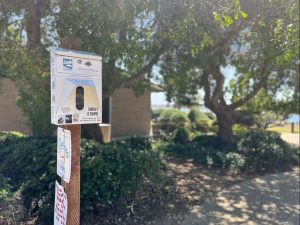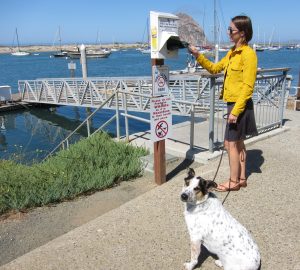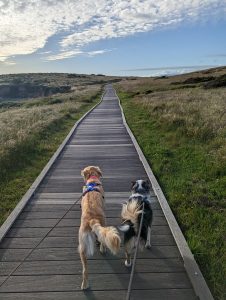Many people are making lifestyle changes to have a more positive impact on the environment, and this can extend to your pets as well! As a dog owner, there are many ways to make eco-friendly choices. Picking up pet waste, following leash requirements in sensitive habitats, and minimizing single-use plastics in toys and accessories are all great places to start.
Pick Up After Your Pet
One of the biggest ways for dog owners to have a positive impact on the environment is to pick up your dog’s poop. Dog waste contains pathogens such as E. coli, salmonella, and giardia, all of which can be harmful to humans. It also contains nutrients such as nitrogen and phosphorus that can cause oxygen depletion and algal overgrowth in nearby waterways such as creeks or the bay. This upsets the balance of the ecosystem and in extreme cases can even kill fish. One dog can produce over 270 pounds of poop in a year. In Morro Bay alone, that equates to about 730,000 pounds of dog poop every year! If left on the ground, this poop (and the bacteria it contains) can make its way into nearby creeks, estuaries, and the ocean. Picking up after your dog helps keep your local waterways clean and healthy for people and wildlife.

It’s a common misconception that dog poop can be left outdoors where it will rapidly decompose like waste from wildlife. Unfortunately, this is not true since the digestive system of dogs has changed over the course of their domestication, and most dog food is very different from what their canine ancestors ate. The result is that dog poop is very different from wild animal poop, and it will not naturally decompose in the same way. Instead, dog poop left outdoors will leach bacteria and other pathogens into the environment and may transmit diseases to wildlife or other pets.
Dispose of Poop Properly
Another misunderstanding is that dog poop can be used as fertilizer. But due to its high bacterial content and slow decomposition, it doesn’t work as fertilizer, nor can it be composted. Many municipal composting facilities, including San Luis Obispo County, do not allow dog poop in green waste bins as their facilities are not equipped to process it. This means that dog poop should go in the trash. Check your local waste management guidance to determine how to properly dispose of pet waste.

Trail Etiquette for Sensitive Habitats
Another way to help protect the environment is to identify which trails and beaches are dog-friendly before you head out. For a variety of reasons, some areas require dogs to be on leashes or don’t allow dogs at all. Dogs can transmit diseases to wildlife, and vice versa. Dogs can also leave behind a scent that may frighten or stress wildlife. Keeping dogs on leash can help reduce erosion on trails and damage to native plants. The rules vary by jurisdiction, so be sure and check before you bring your dog with you.

Other Eco-Friendly Pet Tips
Grooming your dog can be another opportunity to make eco-friendly choices. If you bathe your dog outside, opt for shampoos that contain natural ingredients. Topical flea and tick medication can make your dog’s fur toxic to birds, so the next time you brush your dog, be sure to pick up all the fur rather than “leaving it for the birds.”
Many classic eco-friendly tips for people can be applied to animals as well. Instead of buying new dog toys or accessories, see if you can repurpose things that you have lying around the house like old socks or plastic water bottles. Set up a toy swap with other dog owners in your area to give old toys a new life. If you do buy new items for your dog, try to choose options made with recycled or sustainably sourced materials.
Store-bought dog treats may have a large environmental footprint due to shipping and the water used in production. Consider making your own dog treats with ingredients you might already have in your fridge or pantry.
Interested in learning more about dog waste and our Mutts for the Bay Program? Check out these other blogs!
Help us protect and restore the Morro Bay estuary!
- Donate to the Estuary Program today and support our work in the field, the lab, and beyond.
The Estuary Program is a 501(c)3 nonprofit. We depend on funding from grants and generous donors to continue our work. - Support us by purchasing estuary-themed gear from ESTERO. This locally owned and operated company donates 20% of proceeds from its Estuary clothing line and 100% of Estuary decal proceeds to the Estuary Program. Thank you, ESTERO!
- Purchase items from the Estuary Program’s store on Zazzle. Zazzle prints and ships your items, and the Estuary Program receives 10% of the proceeds.
- Subscribe to our seasonal newsletter: Between the Tides!
- We want to hear from you! Please take a few minutes to fill out this short survey about what type of events you’d like to see from the Estuary Program. We appreciate your input!